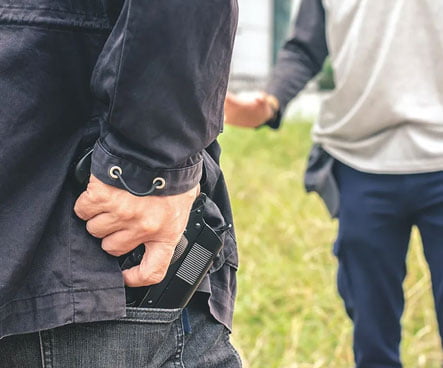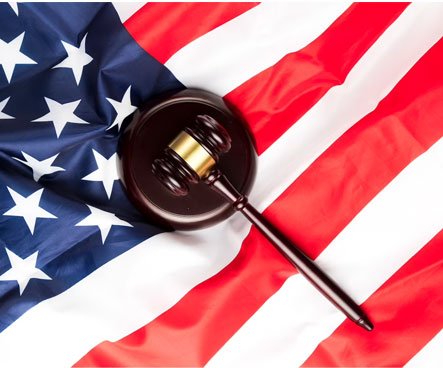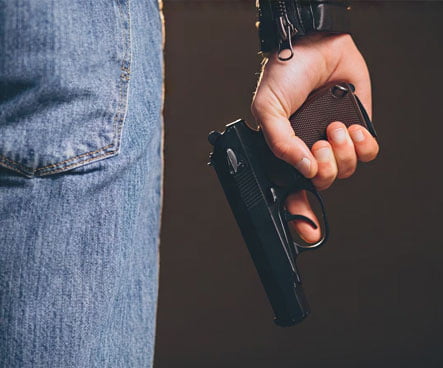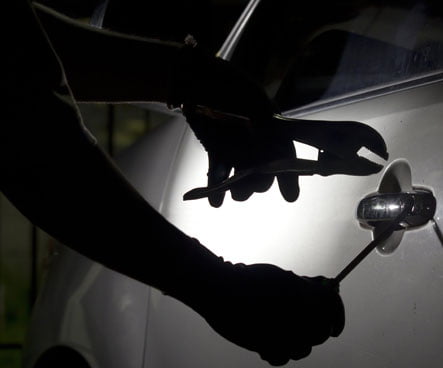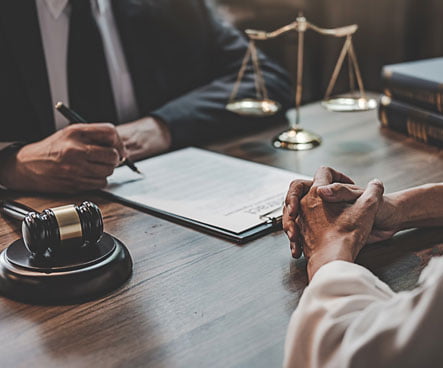Marietta Gun Crime Lawyer
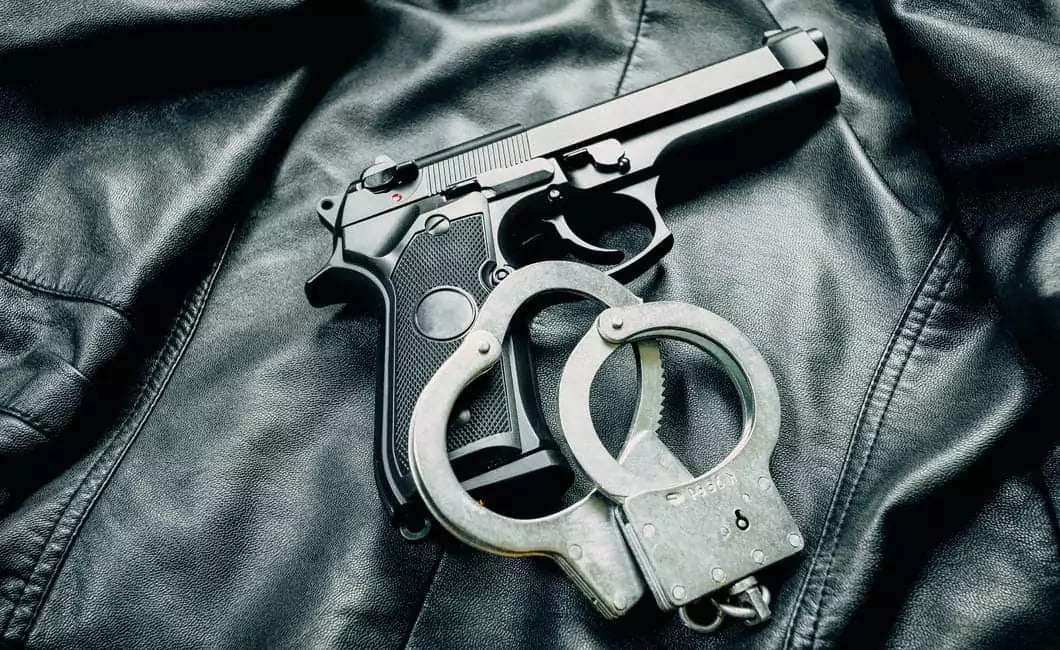
Firearms Crimes
Marietta Gun Crime Attorney
Gun violations are taken very seriously in order to keep the public safe, so even slightly suspicious activity is often pursued. A Marietta gun crime lawyer can help you understand what you’re being charged with, build a case in your defense, and make sure your rights are protected.
Firearms and Weapons Charges in Georgia
Federal control over firearms continues to increase, with government agencies such as the ATF, FBI, DHS, ICE, and U.S. Marshalls pursuing any remotely suspicious activity on their radar. Coupled with this strict government oversight and the crime rate of Georgia, it is not unlikely for someone to face a gun violation– especially if they are not familiar with gun laws.
These are some common gun crimes you may be charged with as a resident of Georgia, in addition to the possible punishments if convicted of a firearms violation:
- Carrying a weapon into a restricted area: Unauthorized locations for carrying a weapon include courthouses, places of worship, nuclear power facilities, public and private school buildings, or school zones (including colleges and universities). It is also unlawful for a person to carry a weapon or long gun to a commercial airport, specifically beyond any security checkpoints.If, in these instances, the owner lacks a firearms license and or infringes upon the law with the intent to commit a separate felony, the offense will be elevated to a felony violation but otherwise would be deemed a misdemeanor.Convictions for a misdemeanor entail a fine, jail time, or a combination of both. Felony crimes are punishable by a large fine, several years imprisonment, or both. If the weapon is considered “dangerous” as it relates to the state legislature, potential incarceration time will increase.
- Discharge of a gun or pistol near a public highway: It is illegal in GA to discharge any firearm within a distance of 50 yards of a public highway. Exceptions may apply, such as lawful shooting practice at an indoor or outdoor range. Conviction for this crime subjects the defendant to penalties befitting a misdemeanor offense.
- Discharging a firearm on another person’s property: The law prohibits a person from discharging a gun on another individual’s property without receiving the property owner’s consent beforehand. This firearms violation excludes law enforcement officers and anyone who fires a gun in order to defend a person or property. Conviction for this misdemeanor includes a fine, jail time, or both.
- Pointing or aiming a gun or pistol at another person: Intentionally pointing or aiming a firearm at another person, whether the gun is loaded or not, is prohibited by law. This can result in a misdemeanor conviction if the defendant is found guilty of such conduct.
- Discharging a firearm while under the influence of alcohol or other substances: Firing a gun while under the influence of alcohol or drugs is considered by Georgia law to be a misdemeanor of a “high and aggravated nature.” Potential punishment upon conviction includes a significant fine, time in jail, or both.
- Furnishing a pistol, revolver, knuckles, or knife to a person aged under 18 years: It is against state law for a person to purposely, knowingly, or recklessly sell or provide a minor under 18 with a pistol or a revolver.This same law applies to knives designed for the purpose of self-defense/offense and any knuckles (made from metal, wood, thermoplastic, etc.). Conviction for this crime would be followed by penalties suitable for a high and aggravated misdemeanor.
- Possession of a handgun by a person under 18 years of age: Any person below the age of 18 cannot own, possess, or be in immediate control over a handgun, according to the state firearms legislature.There are certain exceptions to this rule, such as when the minor person is attending a supervised education course, at an established gun range for the purpose of target shooting, competing or practicing with an organized group for a performance that uses firearms, and when given permission to possess the handgun by a parent or legal guardian.If the defendant has been convicted of a forcible felony or forcible misdemeanor or otherwise committed an offense that would constitute a forcible felony or misdemeanor– no exceptions are allocated. A misdemeanor conviction entails a fine, jail time, or both. If it is their second or subsequent offense, the person will face felony penalties if convicted, which include a larger fine, possible time in jail, or a combination of both.
- Possession of a firearm by a convicted felon or first offender on probation: Felony first offenders on probation or convicted felons cannot legally be in possession of a firearm, including the receiving or transportation of any firearm.It is also a gun violation for any person to solicit another in furnishing or providing a felon (on probation or already convicted) with a firearm, regardless of whether they are transporting it or obtaining it for themself. Imprisonment will proceed with a conviction for this felony crime, and a second or subsequent offense will face even more time in prison.
- Possession of a firearm (or knife) during the attempt or act of committing certain crimes: Possessing a firearm whilst trying to commit unlawful acts or actually conducting illegal activity will be an additional charge against the defendant. This means the accused had a gun or knife (of three or more inches) on their person or within arm’s reach during the unrelated criminal behavior.“Certain crimes” refers to any forcible felony violation that involves the threat or actual use of physical force or violence against another person. If convicted of the other felony, the defendant will face additional penalties for weapon possession, including years of imprisonment. A second conviction for this crime is punishable by a longer prison sentence, with no chance of suspending or replacing the court order with probation.
- Possession of an unregistered or stolen firearm and possession of a restricted gun or unlawful weapons: Firearms and weapons prohibited by law include sawed-off shotguns, sawed-off rifles, machine guns, any silencer (whether for a lawful gun or not), and other dangerous weapons, including knives beyond a specific length, knuckles, rocket launchers, mortars, and hand grenades.To be knowingly in possession of any dangerous or illegal weapon is a felony violation, and conviction is punishable by years of imprisonment along with other subsequent effects.
Other crimes include brandishing a weapon, illegally carrying a concealed weapon, and unlawful sale of firearms. Even if the penalties for a misdemeanor may not seem so serious on the surface, there are various impacts a gun crime conviction can have on your life beyond the immediate legal punishments.
Additional penalties may include community service, revocation of the right to possess a firearm in the future, forfeiting already owned weapons, long-term probation, other repercussions of having a felony on your permanent record, such as difficulty finding employment, and even banishment from the county.
FAQs
Q: How Much Does a Gun Crime Defense Lawyer Cost in GA?
A: The cost of a defense lawyer who can represent your gun violation case will vary, depending on their experience in cases similar to yours, the costs of operation for their firm, their location, and the payment options they offer. Lawyer’s fees are also influenced by how complicated the client’s case is. The ideal way to get an accurate estimate of what your situation may cost is to ask an attorney to review your case.
Q: What Disqualifies You From Owning a Gun in Georgia?
A: A person is likely to be disqualified from owning a firearm in Georgia if they are below 18 years old, have a history of serious mental illness, or have been convicted of a felony offense. Eligible parties can purchase a gun without obtaining a license, registration, or training. Concealed carry also doesn’t require a license or permit.
Q: What Are the Gun Laws in Marietta, GA?
A: In Georgia, no license/permit is required for concealed gun carry but to openly carry necessitates a Weapons Carry License or concealed carry permit. A person cannot own a gun if they’re underage, have a history of mental illness, are a convicted felon, or are a felony first offender on probation. There are also statutes regarding where a gun owner cannot bring their firearm, such as school zones and types of weapons that are illegal to own at all.
Q: Can I Carry My Gun in GA Without a License?
A: Concealed gun carry doesn’t require a license/permit for residents and non-residents of the state if the owner would be eligible for a Georgia Weapons Carry License (WCL) or if they are licensed in another state. For open carrying, a WCL or concealed carry permit is needed, but no training is required. No firearms license is needed to carry a handgun in one’s residence, vehicle, place of business, when fishing or hunting, or if the gun is unloaded inside a case.
A Defense Lawyer to Assist with Gun Charges
Our legal team’s experienced Marietta criminal defense attorney will work diligently to ensure your rights are respected and that you receive the minimum punishment possible for your situation. Reach out to schedule a consultation with an experienced lawyer at The Law Office of Lawrence J. Zimmerman today.
Probation Violation
–State v. G.M.
Rapper Gucci Mane, on probation for anassault conviction, was arrested for possession of a firearm by a convicted felon, possession of marijuana, and DUI. Mr. Mane, facing a possible 3 1/2 year prison sentence, was given only a year in jail.
Federal Weapons Charges
Client was charged with possession of a firearm in federal court in Eugene, Oregon including having a silencer. We went to Oregon and were successful in obtaining home confinement for him.
Office Location
Meet With A Lawyer
Schedule A Consultation
Fields Marked With An “*” Are Required



